|
|
|||
|---|---|---|---|
| 1 | Sleepy Hollow | ||
| 2 | Shakespeare's American Fable | ||
| 3 | The Garden | ||
| 4 | The Machine | ||
| 5 | Two Kingdoms of Force | ||
| 6 | Epilogue: The Garden of Ashes | ||
pastoral ideals | critical argument | motif | contents | landscape | an American machine | Henry Adam's dynamo | dates | conclusion | recapitulation
![]()
The Machine in the Garden is an extended analysis of why America after the World Wars looked as it did and its society behaved as it did so corrupted, if you will, by the commercialization and mechanization though it was not at all obvious to those growing populations of suburban families in what seemed like prosperity literally grounded in an ongoing land boom without consequences.
"By the 'trick' of having a simple shepherd express strong feelings in a sophisticated language, the poet managed to combine the best of both worlds. The reader in turn was put in a position to enjoy the vicarious resolution of one of his culture's deepest conflicts. The result was a kind of conservative quietism."
The Machine in the Garden, p. 129.
“ . . . . It is a serene partnership. In the pastoral economy nature supplies most of the herdsman’s needs and, even better, nature does virtually all of the work. A similar accommodation with the idealized landscape is the basis for the herdsman’s less tangible satisfactions: the woods ‘echo back’ the notes of his pipe. It is as if the consciousness of the musician shared a principle of order with the landscape and, indeed, the external universe. The echo, a recurrent device in pastoral, is another metaphor of reciprocity. It evokes that sense of relatedness between man and not-man which lends a metaphysical aspect to the mode; it is a hint of the quasi-religious experience to be developed in the romantic pastoralism of Wordsworth, Emerson and Thoreau. Hence, the pastoral ideal is an embodiment of what Lovejoy calls ‘semi-primitivism”; it is located in a middle ground somewhere ‘between,’ yet in a transcendent relation to, the opposing forces of civilization and nature."
Leo Marx, p. 23, ¶1; §3-9.
![]()
Leo Marx’s dialectical tension is critical to understand the two ideals.
These two ideals can be glimpsed here as the bucolic countryside as the seat or setting for the urban machine. He writes "Hence the pastoral ideal is an embodiments," that he argues is an attempt to balance, harmonize or reconcile "the opposing forces of nature and civilization."
Marx, p. 23.
"The pastoral ideal has been used to define the meaning of America . . . and not yet lost its hold upon the native imagination."
"begin a new life in a fresh, green landscape" (3)
This is a key argument: the pastoral ideal acts as
both a literary device and a political ideology
popular sentimentality vs. imaginative complexity
"the felicities and miseries can be reconciled together."
page, 45.
"Few recognized that a most striking fact about the New World was its baffling hospitality to radically opposed interpretations."
"The paradox was to be a cardinal subject of our national literature."
American society:
"Nick soon discovers that suburban greenness, like Tom's clothing, is misleading. It too is a mask of power , and on the way to Manhattan he sees a more truly representative landscape of this rich and powerful society. . . . "
Marx, p. 357.
Key ideas:
A crucial dichotomy in this book is:
sentimental versus imaginative:
sentimental realistic simple refuge an inspirational source of tension
We must use two ways to think about the pastoral image simply as a refuge and as an inspiration that both tap into the unconscious longing for reunion
"mental domain of phantasy," Freud's subconscious part of the brain where wishes and magical thinking reside.
"The 'reservation' is to maintain the old condition of things which has been regrettably sacrifice to necessity everywhere else; there everything may grow and spread as it pleases, including what is useless and even what is harmful. The mental realm of phantasy is also such a reservation reclaimed from the encroaches of the reality principle."
![]()
Sleepy Hollow is July 27, 1844; Sleepy Hollow,
Concord
Sleepy Hollow: "intruding- crude masculine aggressiveness vs. tender submissive feminine landscape."
(p. 29)
model, a schematic description –usually simplified – that accounts for larger and more complex systems;
an ideal that is scaled down to an understandable dimension or size and used to display the many detailed aspects of related ideas, inventions, or conceptual arguments that explain a greater whole.
motif, a thematic element in music, art, or writing; a rhetorical device to order the appreciation of a work
a literary or artistic creation that is used to evoke a response or employed to repeatedly refer to a set of related emotional, rational, and sensory responses.
"the symbolic power of the motif: it brings the political and the psychic dissonance associated with the onset of industrialism into a single pattern of meaning."
(p. 30)
"Disorder in society follows close upon disorder in nature."
The Machine in the Garden, p. 51.
![]()
Terminology
The Machine in the Garden, pp. 8, 18-19, 31, 51, 67, 71.
pastoral ideals | critical argument | motif | contents | landscape | an American machine | Henry Adam's dynamo | conclusion
![]()
Wilderness as the soul's redemptive arena, Sinai desert.
John the Baptist & desert of Canaan, The Jordan River.
"All things in common Nature should produce
Without sweat or endeavor:"
Gonzalo, The Tempest.
"Providence divine"
Prospero, is a magus or magician whose power transforms the raw scenery into Plato's second nature, more perfected.
Caliban, represents the wild forces of the earth resisting any control of this immigrant (shipwrecked and exiled) sorcery; in this sense he operates as something of a reminder to the audience of Native Americans and later Africans who were enslaved to work the resources.
quotes from Shakespeare concerning the "paradisiacal setting," Marx, pp. 49-51.
"Like Arcadia or Virginia . . . Shakespeare's uninhabited island . . . is remote and unspoiled,
and at first thought we are like likely to remember it as a kind of natural paradise."
Marx, p. 48.
Arcadia and Virginia: the literary ideal vs. wild reality
"But Beverly's History (1705) does indicate the special appeal that the new epistemology was to have in America; it must have seemed particularly apt to a writer attempting to describe , say, how the British in Virginia are 'ravished with the Beauties of naked Nature'."
Beverly quoted by Marx, p. 83.
The garden [of Eden] as repository of the good
What is the landscape of Ceres?
The ancient Arcadian ideal
Thomas Cole's paintings in 1858 were exhibted in a series. "Cole's travels and the encouragement and patronage of the New York merchant Luman Reed culminated in his most ambitious historical landscape series, The Course of Empire (1834 – 36; New York Historical Society), six pictures dramatizing the rise and fall of an ancient classical state."
Metropolitan Museum
Kevin J. Avery
Department of American Paintings and Sculpture, The Metropolitan Museum of Art.
Those paintings [ the second in the series is shown above ] trace the development of civilization from its raw emergence to its rise into an empire and eventual decay. He evoked a motif which is embodied in Champs Elysee, or the "Elysian Field's," literally a pastoral landscape maintained by grazing livestock, but figuratively meaning any land occupied by farms, fields, pastures, & groves of the arable terrain.
"The Tempest... is a comedy in praise neither of nature nor of civilization, but of a proper balance between them."
The Machine in the Garden, p. 64-65, 62, 67.
Chapter One; Part Four, summation
Why use Shakespeare's The Tempest?
"The contradiction within the Elizabethan idea of the New World."
"is the virgin land"
garden or howling wilderness?
p. 66.
plantation in paradise: American sugar, tobacco, indigo
"the art itself is Nature." artificial resides within natural
What is the phantasm & the fable?
Robert Frost, poet laureate (1961) "The Gift Outright:"
"The land was ours before we were the lands"
* Leo Marx, p. 150.
pioneers received a great fortune due to significant efforts (sweat equity), but without a commensurate amount of understanding concerning the inherent needs of the nation's native landscapes.
pastoral ideals | critical argument | motif | contents | landscape | an American machine | Henry Adam's dynamo | conclusion
"the intensity of his belief in the land, as a locus of both economic and moral value,..." Jefferson *
The Machine in the Garden, p. 72
"an appropriate landscape of reconciliation"
The topography of the Tempest anticipates the moral geography of the American imagination
Kentucke -- the dark and bloody ground
the legends of the three colors
Red -- native (Indian) peoples (Seneca)
White -- European descendants
Black -- African descendants
mestizo process: the mixture of native, European & African ancestries
The original sin of the pioneers is slavery that evokes the story of Cain slaying Abel
(fratricide) herdsman vs. farmer
Providence and Progress
"the sequence embodies the Lockian presuppositions,... about the relations between nature, man, and society.
"in the beginning," said John Locke, "all the world was America ...."
landscape of reconciliation is the settlement of the colonial and western lands because the simple edenic escape is both implausible and the land belonged to others, not Europeans.
"Those who labour in the earth are the chosen people..." The Machine in the Garden, p. 119-120.
§§§
America as a new Eden; the Bible's original garden is recovered in the New World.
The situation gives rise to the plausibility of a pastoral retreat (an escape): "But I reckon I got to light out for the Territory ahead of the rest, because Aunt Sally she's going to adopt me and sivilize me, and I can't stand it." as Samuel L. Clemens wrote in Huckleberry Finn (1885 ).
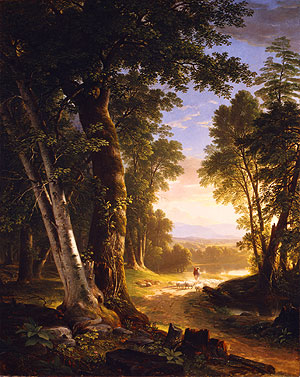
The Garden . . . . as a pastoral utopia is the icon for America; a place of abundance for our taking.
The Machine in the Garden, pp. 73, 75, 82.
"a fully articulated pastoral idea of America did not emerge until the end of the eighteenth. The story of its emergence illustrates the turning of an essentially literary device to ideological or (using the word in its extended sense) political uses.
By 1785,... the pastoral ideal had been removed from the literary mode to which it traditionally had belonged and applied to reality."
"the stock image of America as nature's garden, a new paradise of abundance."
Robert Beverley (1703)
anticipates the coming fashion in thought & feeling
foundations of romanticism lie in Locke & Newton
"sensational psychology" landscape as sensory area
Leo Marx, pp. 91-93, 98.
Agriculture, agrarianism and the French Physiocrat's belief in the land.
"In the vast collection of arid theorizing on the subject, . . . there is no recognition of the gulf that was opening between the convention and the feeling that people now had in the presence of nature."
"the whole rural scene as if it were some vast garden."
"the primacy of agriculture in creating the wealth of nations.": Adam Smith, who influenced both Benjamin Franklin, Thomas Jefferson
Physiocrat's beliefs: Land is the sole source of value & wealth and large-scale market agriculture is the basis of stable, substantial, and successful nations.
![]()
Technical implements of agriculture changed from 1720 to 1840.
Techniques changed from 3 to 4 field rotation cropping in the 1700s in England, as soil conservation spread.
A sequence transpired; appears in literature based on an ancient concept:
1) Gardens emerge as the metaphor (Voltaire) for the highest form of transforming
2) wild -unproductive- nature with a second nature (Cicero);
3) a cornucopian phantasia!
The reality was a plantation commercial economy needed slaves & steam engines for sugar and cotton production.
pastoral ideals | critical argument | motif | contents | landscape | an American machine | Henry Adam's dynamo | conclusion
"A cluster of natural images -- the rural landscape, plants, organic growth, gardens and gardening -- connects Jefferson's political theories with his physical tastes. Like a great poet, he achieves a striking fusion of intellectual and sensual experience."
"A garden is a miniature middle landscape. It is a place as attractive for what it excludes as for what it contains. Working in his garden he is free of the anxieties and responsibilities of political office. By the same token, if all of America somehow could be transformed into a garden, a permanently rural republic, then its citizens might might escape from the terrible sequence of power struggles, wars, and cruel repressions suffered by Europe. This is the 'logic' back of what is known as the Jeffersonian dream–a native version of an ancient hope."
p. 138.
 Thomas Jefferson, 1st Secretary
of State; 3rd President of the United States
Thomas Jefferson, 1st Secretary
of State; 3rd President of the United States
author of the Declaration of Independence
author of the Land Ordinance of 1785
founder & designer of the University of Virginia
author of the "Act for Religious Toleration" in Virginia
Jefferson's ideas about geography were expressed in Notes on Virginia
Quadrangle of the University of Virginia, created from Jefferson's design.
The Machine in the Garden, p. 119-120.
author of Notes on Virginia (1785)
initiator of the Louisiana Purchase (1803)
caretaker of slaves and the Monticello Plantation
The landscape of reconciliation
"Those who labour in the earth are the chosen people..."
![]()
“The Machine” and the complex pastoral tradition as a disturbance motif
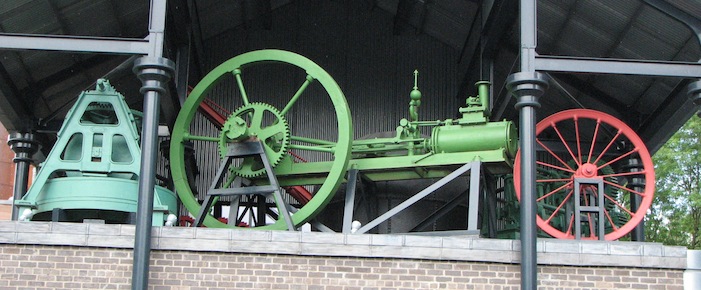
“New Eyes”: metaphors and perspective form an inseparable mental bond
March 1776, Matthew Boulton said to Boswel
“I sell here, Sir, what all the world desires to have --- POWER.”
700 workers in one place; Soho works where steam engines were manufactured was a revolution in labor.
“industrial revolution” was a phrase coined in France circa 1810 linked the political & the technological to the more prevalent belief in progress
Influences on the development of American attitudes towards landscape and resources:
1. the economy of abundance supplanted the economy of scarcity
2. the wealth of nations shifted from agrarian ends to the ownership of the means of production
3. external form replaced the internal substance as the measure of value
Pivotal Age 1785-1810: the emergence of a new complexity with a serious consequence: the diminishing of the human soul.
1. technological transformation: steam engine, automated grinding mill, interchangeable parts, factory system
2. intellectual shift in attitudes: machinery & a “degeneration” of “aesthetical education” & tacit knowledge
3. population growth: rural depopulation & urban explosion; the prolonged march to the cities began
Beneath the aging of American culture was a longer tradition embodying a response to the tensions created by commercialism and imperial ideologies.
European origins of discontent
German Romanticism: Friedrich Schiller
“common and coarse mechanism”
“he never develops the harmony of his being.”
![]()
Thomas Carlyle [1795-1881]
social alienation:
“wealth has more and more increased, and at the same time,....increasing the distance between the rich and the poor….”
“The same habit regulates not our modes of action alone, but our modes of thought and feeling. Men are grown
mechanical in head and in heart, as well as in hand.”
Marx, p. 174.
“for not in turning back, not in resisting, but only in resolutely struggling forward, does our life consist.”
“in the long run, by destroying Moral Force, which is the parent of all other Force, prove ..., pernicious.”
“ 'destruction of moral force' ~ “alienation"
(176)
“the devaluation of the human world, increases in direct relation with the increase in value of the world of things.”
“mechanism” squelches the “primary, unmodified forces and energies of man.”
Sartor Resartus (1833-34) Carlyle's novel.
“it was one huge, dead, immeasurable Steam-engine, rolling on, in its dead indifference, o grind me limb from limb.”
(179)
Emerson & Melville read Carlyle
Thomas Carlyle
Three important literary works of influence
Nature (1836) Ralph Waldo Emerson [1803-1882]
Intrusion in Sleepy Hollow (1844) Nathaniel Hawthorne, [1804-1864]
Moby Dick (1851) Herman Melville, [1819-1891]
Hawthorne’s kinship with with Thoreau [1817-1862]
“Nature in return for his love seems to adopt him as her special child, and shows him secrets which few others are allowed to witness.”
(95)
Relations among the "literati" and the Adirondacks:
1858 -- Emerson, Lowell, Agassiz -- August Adirondack retreat
Lowell: “Our American semi-civilization is all round this tract, but has not yet penetrated into it.” (98)
Lowell was editor of the Atlantic Monthly from 1857 which promoted John Borroughs & later John Muir
M- ch 4.~
What are the moral dimensions of the edenic vision?
“Our country is the world -- our countrymen are all mankind.” Wm. Lloyd Garrison (1831)
Jefferson -- 3rd President of the U.S.; democrat, populist &
Carlyle -- British author, critic, moralist, editor
"the landscape was transformed"
critical argument | contents | landscape | an American machine| Henry Adam's dynamo | conclusion
![]()
Claude Lorraine made landscape the focus of his painting and art.
"In the record of western culture there is nothing to compare with this vogue for landscape that arose in this period." p. 88
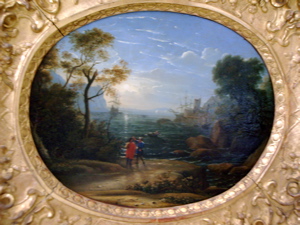 "They often carried Claude (Lorraine) glasses, pieces of tinted, framed glass with
handles....the significant fact is that the glass helped to create a pastoral
illusion."
"They often carried Claude (Lorraine) glasses, pieces of tinted, framed glass with
handles....the significant fact is that the glass helped to create a pastoral
illusion."
"images of perfect harmony between man and nature ... as if he knew that this perfection could last no longer than the moment in which it takes possession of our minds."
(89)
Pursell, White Heat, p.73.
"The linking of what [Hunter] Dupree terms 'bench marks' -- to the miles that interested the trader, soldier and sovereign, was one of the great intellectual feats of western civilization. One dramatic extension of this system occurred in 1785 when the new confederation of American states decided to order a survey of its newly acquired western lands mapped on a grid in sections of one square mile.... a visible feature .. etched on the land today."
"lands mapped on a grid in sections of one square mile -- a visible feature etched on the land today."
"burned into the politics and economics... as well."
Leo Marx, pp. 94, 95, 144-145.
critical argument | contents | landscape | an American machine | Henry Adam's dynamo | conclusion
![]()
"The Seasons"
James Thomson, 1730:
"By Nature's swift and secret-working hand,
The garden glows, and fills the liberal air
With lavish fragrance; while the promised fruit
Lies yet a little embryo, unperceived,...."
![]()
1812: Jefferson's Letter
"Our enemy, has indeed the consolation of Satan on removing our first parents from Paradise: from a peaceable and agricultural nation, he makes us a military and manufacturing one."
1928: William Butler Yeats, "The Tower"
"Locke sank into a swoon;
The Garden died;
God took the spinning-jenny
Out of his side."
Leo Marx, Machine in the Garden, pp. 138-145.
Jefferson to Charles Wilson Peale: on gardens
"I have often thought that if heaven had given me a choice of my position and calling, it should have been on a rich spot of earth, well watered and near a market for the productions of the garden." (1811, personal letter) (138)
"the controlling principle of Jefferson's politics .... is dialectical.." (139)
"Beginning in Jefferson's time, the cardinal image of American aspirations was a rural landscape, a well ordered green garden magnified to continental size....This is the countryside of the old Republic, a chaste, uncomplicated land of rural virtue." (141)
Jefferson's genius lay in his capacity to respond to the dream yet disengage himself from it. ... and his superb mind maintained its poise as it moved ceaselessly between real and imagined worlds." (143-44)
What is the meaning of a pastoral ideal?
The Machine in the Garden, pp. 74-75, 139-140, 142-143.
"it is necessary to insist upon the vital distinction between the pastoral ideal and the pastoral design.
"a highly wrought aesthetic form... ordering of meanings" [expressive: literary and artistic]
"Jefferson's formulation of the pastoral ideal affirms a belief which may serve as a guide for social policy."
"For more than a century,...The American people held on to a version of the pastoral ideal not unlike the one that Jefferson had set forth in 1785, investing it with a quality of thought and feeling that can only be called mythic.
"...myth as a mode of belief.... they shared an idea ....actually saw themselves creating a society in the image of a garden . . . . a believable definition of reality."
"It [his political principle] lies in his [Jefferson's] recognition of the constant need to redefine the 'middle landscape' ideal, pushing it ahead, so to speak, into the unknown future to adjust it to ever changing circumstances. (The ideal, in fact, is an abstract embodiment of the concept of mediation between the extremes of primitivism and what may be called 'overcivilization'." 139-140
The Machine in the Garden, p. 74, 96-98.
Next.
Threads of the emergent approach to nature:
Sir Isaac Newton (1687) reliable external reality
sensory based psychology of John Locke (1690s)
"a massive shift in prevailing ideas about man's relations to nature."
Physiocrat's beliefs in - agrarian enterprise is the source of wealth
Rousseau's ideal suggests the state of nature is healthy and the source of the good.
Burke's idea of the sublime
Gilpin's idea of the picturesque
emotion and feeling equal or superior to reason
"appeal of the rural as against urban life."
a preoccupation with the truth of the expressive arts
A passion for nature, wild or cultivated, but from this untenable dichotoay emerges a middle ground
This middle ground is actually a means to reconcile the coming of machinery into the heart of paradise.
Leo Marx, p. 150, 153.
critical argument | contents | landscape | an American machine| Henry Adam's dynamo | conclusion
![]()
The Middle Landscape
"From Jefferson's perspective, the machine is a token of that liberation of the human spirit to be realized by the young American Republic . . . . Once the machine is removed from the dark, crowded, grimy cities of Europe, he assumes that it will blend harmoniously with the countryside . . . . helping to transform a wilderness into a society of the middle landscape."
"Factories which can be carried on by water-mills, windmills, fire, horses and machines ingeniously contrived, are not burdened with any heavy expense of boarding, lodging, clothing and paying workmen, and they supply the force of hands to a great extent without taking our people from agriculture."
Tench Coxe
"By wind and water machines we can make...iron...."
Leo Marx 161-163.
![]()
Three approaches to machinery:
1. the machine represents an intrusion into the garden
simple pastoral
Hawthorne's "Sleepy Hollow, 1844"
2. machinery makes the wilderness into a garden or the middle landscape
The landscape of reconciliation
complex pastoral, the emergence of a new twist to the complexity of "redemption"
Emerson's "Nature" his admonition that "Things are in the saddle and ride mankind."
3. beginning in the countryside machinery made the industrial revolution no worse than the plantation slavery it ultimately replaced both economically & politically.
fine technology
"the Newtonian world machine" [ dream- ideal ]
Coalbrookdale, Shropshire, England, U. K.
Cyrus McCormick 1834-55 & Henry Ford 1896-1910
An American Philosopher
Ralph Waldo Emerson [1803-1882]
"The kingdom of man over nature, which cometh not with observation,–a dominion such as now is beyond his dream of God,–he shall enter without more wonder than the blind man feels who is gradually restored to perfect sight."'
Nature (concluding lines)
“book of nature....It should contain the natural history of the woods around my shifting camp for every month of the year. It should tie their astronomy, botany, physiology, meteorology, picturesque and poetry together....Nothing is beautiful alone. Nothing is but is beautiful in the whole.” (1833)
“we heard the rustle of the wind in the grass, and new again the ineffable secret of solitude....(1858)
Nature (1835-36)
“...profound changes in the American attitude toward nature would be brought about through its influence.”
“enjoy an original relation to the universe.”
“an occult relation between man and the vegetable”
“spirit,.... the Supreme Being, does not build up nature around us but puts it forth through us.”
“nature is not fixed but fluid. Spirit alters, molds, makes it.…build therefore your own world.”
“our protest against false society”
“The reason why the world lacks unity, and lies broken and in heaps, is because man is disunited with himself…. It will not need…to search for objects. The invariable mark of wisdom is to see the miraculous in the common.... So shall we come to look at the world with new eyes.”
“Coal is a portable climate.” Conduct of Life; “Wealth” 1860. “The world is his, who has money to go over it.”
"No major writer has come closer to expressing the popular conception of man's relation to nature in nineteenth-century America."
(230)
"Emerson had adapted the rhetoric of the technological sublime to his own purposes."
"...by the aggregate of these aids, how is the face of the world changed!"
"....Nature is thoroughly mediate. It is made to serve ..., until the world becomes at last only a realized will, -- the double of the man."
(231)
"Things are in the saddle and ride mankind."
"If technology is the creation of man [humans], who is the product of nature, then how can the machine in the landscape be thought to represent an unresolvable conflict?" (242)
"In support of his preference for the 'natural' as against the 'artificial' (urban) landscape, he invokes the familiar distinction, indirectly derived from Kant, between two faculties of mind: Understanding and Reason."
Understanding and Reason
empirical, practical spontaneous, imaginative
mode of consciousness intuitional perception
(233)
"dualistic theory of mind provides a firm base
“nature is not fixed but fluid. Spirit alters, molds, makes it.…build therefore your own world.”
“our protest against false society”
“The reason why the world lacks unity, and lies broken and in heaps, is because man is disunited with himself…. It will not need…to search for objects. The invariable mark of wisdom is to see the miraculous in the common.... So shall we come to look at the world with new eyes.”
At what point does “progress cease to be progress”
Leo Marx, The Machine in the Garden, p. 226
critical argument | contents | landscape | an American machine | Henry Adam's dynamo | conclusion
![]()
Pastoral Ideal
“The pastoral idea of America had, of course, lent itself to this illusion from the beginning. In the eighteenth century it had embraced a strangely ambiguous idea of history. It then provided a clear sanction for the conquest of wilderness, for improving upon raw nature and for economic and technological development -- up to a point.”
“As time went on, accordingly, the idea became more vague, a rhetorical formula rather than a conception of society, and an increasingly transparent and jejune expression of the national preference for having it both ways. In this sentimental guise the pastoral ideal remained of service long after the machine’s appearance in the landscape. It enabled the nation to continue defining its pursuit of rural happiness while devoting itself to productivity, wealth, and power. It remained for our serious writers to discover the meaning inherent in he contradiction.”
Leo Marx, Machine. pp. 228-229.
"the myth affirms that ... regeneration ...."
"---they [Europeans in America] are reborn."
"Nature is what accounts for the virtue and special good fortune of Americans. It enables them to design a community in the image of a garden, an ideal fusion of nature with art."
"The landscape thus becomes a symbolic repository of value of all kinds -- economic,political, aesthetic, religious. It has been suggested that the American myth of a new beginning may be a variant of the primal myth described by Joseph Campbell: 'a separation from the world, a penetration to some source of power, and a life enhancing return."
"The sudden appearance of the machine in the garden is an arresting, endlessly evocative image."
"shattered ruins of a dreamer's Utopia"
Leo Marx, p. 229, 266, 285-87.
critical
argument | contents | landscape
| an American machine | conclusion![]()
Sleepy Hollow's disturbance by the locomotive "is a cardinal metaphor of contradiction."
"3 more or less recognizable and indistinct uses, or interpretations of the Sleepy Hollow motif."
1) transcendental call to restore moral values: Emerson & Thoreau
2) recognition of the tragically flawed core: Hawthorne & Melville
3) vernacular revelation of the original sin: Clemens (Mark Twain) Huckleberry Finn
Summary Henry James & Henry Adams
critical argument | contents | landscape | an American machine | conclusion
![]()
Two Kingdoms of Force are the archaic, Virgin imagery, the traditional, agrarian or pastoral in competitive contest with the motive force of progress a kind of "technological sublime" that embodies the very hell and heaven of a child's dreams ending in a contradiction at the core of national values as seen in the critically acclaimed and "annointed" literature.
Leo Marx, pp. 264-265.
"In Walden Thoreau is clear, as Emerson seldom was, about the location of meaning and value. He is saying that it does not reside in the natural facts or in the social institutions or in anything 'out there,' but in the consciousness. It is a product of imaginative perception, of the analogy-perceiving, metaphor-making, mythopoeic power of the human mind." (264)
"Since it has nothing to do with the environment, with social institutions or material reality (any facts will melt if the heat of imaginative passion is sufficient), then the writers physical location is of no great moment."
"There is a world of meaning in the casual tone." Marx
Thoreau concludes Walden with : "I delight... not to live in this restless, nervous, bustling, trivial Nineteenth Century, but stand or sit thoughtfully while it goes by." (265)
critical argument | contents | landscape | an American machine | conclusion
![]()
Melville's tragedy of Moby Dick
Melville's Moby Dick or The White Whale is placed in this larger tradition, Melville, in 1850, read Carlyle and Hawthorne's Ethan Brand:
"The Unpardonable Sin might consist in a want of love and reverence for the Human Soul; ... the separation of the human intellect from the heart." (266)
"Is there no green thing to be seen?"
(Melville, p. 285)
Leo Marx, pp. 265, 286-87.
"... a darker view of life .... also conveys a sense of the widening gap between the fact and ideals of American life, but the implications are more ominous." (265)
Fatalism -- destructive insensitivity of mechanization
Pequod, the whaling ship is a microcosm of society: a
"material counterpart of her monomaniac commander's soul." [Captain Ahab] "They were one man, not thirty. . . all varieties . . . wedded into oneness, and . . . all directed to that fatal goal which Ahab their one lord and keel did point to." (287)
Ahab's "splintered heart and maddened hand"
"the overwhelming idea of the great Whale himself."
"portentous and mysterious monster."
"one grand hooded phantom, like a snow hill in the air."
Leo Marx, pp. 279-280.
![]()
Influential ideas among elites:
| Emersonian triad: | ||
self-reliance solitude |
||
 |
||
|
||
divine providence manifest destiny |
individualism atomism |
|
Social forces influencing the population:
Poetry of travel was surpassed by a new relation among
urbanization & public health
industrialization & machines
“age of science” 1840-1870 Geology-Darwinism-Electricity
American characteristics were forged in the manufacturing revolution that began in the 1820s and climaxed in the great struggle of the war between the states leaving urban, commercial and industrial values ascendant in economics, if not completely dominant in politics and culture of the 1880s.
It was Clemens and Warner who satirically referred to the era as the "Gilded Age," since the appearances did not quite equal the cultural achievements of the Augustan or Periclean "golden" ages of ancient Rome and Greece.
critical
argument | contents | landscape | an American machine | conclusion![]()
Melville's Platonic & Miltonian recollection
Leo Marx, pp. 287-300.
Melville consciously revives Plato's warning in Phaedrus and Milton's admonition in Paradise Lost's "Mammon":
"I will strip these men, thought Ahab, of all hopes of cash -- aye, cash. They may scorn cash now; but let some months go by, and no prospective promise of it to them, and then this same quiescent cash all at once mutinying in them, this same cash would soon cashier Ahab."
Marx: "Nowhere does Melville display greater political acumen then in defining the paradoxical affinity between Ahab and the mechanistic view of life. . . . His [Ahab's] ability to complement their limited perceptions is a savage comment upon a culture obsessed with the technical, external arrangements of life." (299)
"The shattering fact is that his madness fits the needs of this technically proficient society."
"Now in his heart, Ahab had some glimpse of this, namely: all my means are sane, my motive and my object mad." (300)
Metaphors in Ahab's speech to the crew on the quarterdeck when he nails the doubloon to the mast, thereby offering it as a reward for the first to site the whale: "my one cogged circle fits into all their various wheels, and they revolve."
Marx: "the ends -- for which they (the crew) are the means."
critical
argument | contents | landscape
| an American machine | conclusion![]()
Huckleberry Finn (1884-85)
"Huck's decision to tear up the letter is justly recognized as an exalted moment in the record of the American consciousness. It joins the pastoral ideal with the revolutionary doctrine of fraternity." (familiarity)
p. 338.
"somehow had discovered the tragic thread that invariably runs through the fabric of complex pastoralism."
Marx, p. 339.
Of the betrayal of Jim and his return into slavery Huck says : "After all this long journey,... here was it all come to nothing, everything all busted up and ruined."
"...the book drew its power from the contradiction resolved in that scene (return to Phelps' Farm). It is in essence the same conflict of values that made itself felt, earlier, when the steamboat had smashed the raft."
critical argument | contents | landscape | an American machine | conclusion
![]()
Karl Marx, Das Kapital, pt. II, chapters 3, 10, & 21.
"Religion… is the opium of the people. (1844)
"It is not the consciousness of men that determines their existence, but on the contrary their social existence determines their consciousness." (1859)
"Nothing can have value without being an object of utility. If it be useless, the labor contained in it is useless, cannot be reckoned as labor, and can not therefore create value."
Das Kapital [1867-1883]
"The intellectual desolation, artificially produced by converting immature human beings into mere machines."
"When commercial capital occupies a position of unquestioned ascendancy, it everywhere constitutes a system of plunder."
critical argument | contents | landscape | an American machine | Henry Adam's dynamo | conclusion
![]()
Two Kingdoms of Force
Medieval organicism vs. contemporary industrialism
intuitive rational
growth progress
mother earth inanimate natural resources
Pastoral Mechanical
humanistic automated
critical argument | contents | landscape | an American machine | conclusion
![]()
" Man has mounted science and is now run away with. I firmly believe that before "many centuries more, science will be the master of man. The engines he will have invented will be beyond his strength to control. Some day science may have the existence of mankind in its power, and the human race commit suicide by blowing up the world."
(1862 letter of Henry to brother Charles, p. 350)
Henry James return: Farmington, Connecticut, "the Barbizon of America."
Leo Marx, pp. 352-353.
critical argument | contents | landscape | an American machine | conclusion
Henry James
"a perfect consistency of surrender to the argument of the verdurous vista...great elm-gallery happens to be garnished with old houses, and the old houses happen to show style and form and proportion...." (352)
"The bullying railway orders them off their own decent avenue without fear that they will 'stand up' to it. . . ."
This look as of universal acquiescence... plays somehow through the visible vacancy --- seems a part of the thinness, the passivity, of that absence of the settled standard which contains ... the germ of the most final of all of my generalizations."
Henry James (William's brother)
"James sees in Farmington... a thematic or symbolic landscape....The contrast between the machine and the pastoral ideal dramatizes the great issue of our culture."
critical argument | contents | landscape | an American machine | conclusion
Epilogue
Marx, p. 354-5, 357.
"Ours is an intricately organized, urban, industrial, nuclear-armed society. For more than a century our most gifted writers have dwelt upon the contradiction between rural myth and technological fact. In the machinery of our collective existence, Thoreau says, we have 'constructed a fate, an Atropos,' that will neve turn aside." (354-55)
"And until we confront the unalterable ... there can be no redemption from a system that makes men the tools of their tools."
"The lawn, started at the beach and ran toward the front door for a quarter of a mile, jumping over sun-dials and brick walks and burning gardens -- finally when it reached the hose drifting up the side in bright vines as though from the momentum of its run."
Nick Carraway from F. Scott Fitzgerald's The Great Gatsby (1925)
The Great Gatsby's setting on Long Island
About halfway between West Egg and New York the motor road hastily joins the railroad and runs beside it for a quarter of a mile, so as to shrink away from a certain desolate area of land. This is a valley of ashes -- a fantastic farm where ashes grow like wheat into ridges and hills and grotesque gardens; where ashes take the forms of houses and chimneys and rising smoke...." (357)
There was a machine in the kitchen which could extract the juice of two hundred oranges in half an hour if a little button was pressed two hundred times by a butler's thumb." (358)
"Most of the big shore places were closed now and there were hardly any lights except the shadowy, moving glow of a ferryboat from across the Sound. . . . face to face for the last time in history with something commensurate to his capacity for wonder.... a vast, vulgar & meretricious beauty."
Last Words
Marx, pp. 364-65.
"When the blue smoke of brittle leaves was in the air ... I decided to come back home." Nick Carraway
"So we beat on, boats against the current, borne back ceaselessly into the past."
"The resolutions of our pastoral fables are unsatisfactory because the old symbol of reconciliation is obsolete. But the inability of our writers to create a surrogate for the ideal of the middle landscape can hardly be accounted artistic failure. By incorporating in their work the root conflict of our culture, they have clarified our situation."
"To change the situation we require new symbols of possibility, and although the creation of those symbols is in some measure the responsibility of artists, it is in greater measure the responsibility of society. The machine's sudden entrance into the garden presents a problem that ultimately belongs not to art but to politics."
Marx, pp. 357-361.
critical argument | contents | landscape | an American machine | conclusion
![]()
attitudes are ambivalent about land & technology
Siry from Huth, Hardin, Marx, McHarg, Schama, Nash, Wilson, Worster, Merchant, Cronon, H. N. Smith, Sears, & Sauer.
Landscape as a visually coherent area characterized by a demarcated space and measured against human behavioral, social, and spiritual needs;
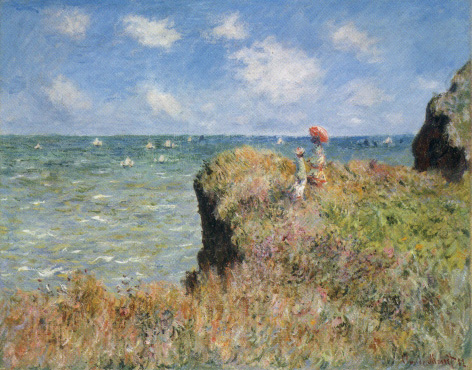
A view shed is a birds-eye-view of a setting:
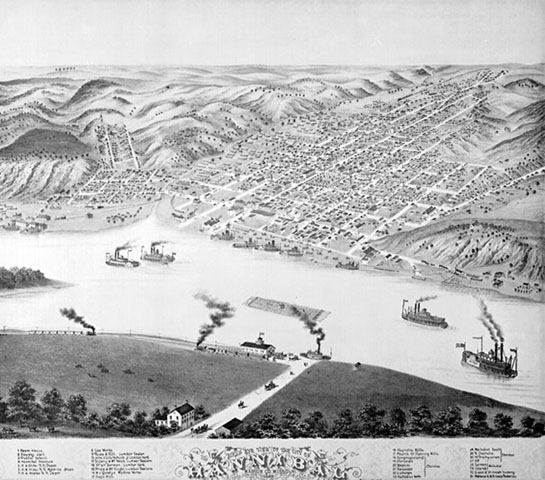
Redefinitions:
critical argument | contents | landscape | an American machine | conclusion
![]()
industrial revolution "Coined in France sometime around 1810, the phrase expresses the close kinship between the two new forces, political and technological, which were to threaten the old order everywhere during the next 150 years."
*see page 187, Marx.
pioneer attitudes
"However, unless natural resources are used and distributed in accordance with man's needs and without undue waste, few of these treasures will be left to enrich the lives of future generations."
“the pioneers pushed the frontier farther west,”. . . "The axe was even accepted as the appropriate symbol of the early American attitude toward nature. The most profound impression received by observers traveling in this country in the eighteenth and nineteenth centuries was invariably that made by the extraordinary success with which the enterprising Yankees were settling lands west of the eastern seaboard. It was a revelation to travelers to find cities in areas which only recently had been Indian territory . . . . "
"Receding timber stands were accepted as a matter of course, and whatever loss might result from the removal of a few trees appeared overbalanced by the increase in farmland and the growth of cities."
*see page 2 Huth;
Such ideas as these were to give rise to a cowboy economy, where extraction came with discounted costs.
Jeffersonian idealism -- a curious mix of progress & the political transformation of pastoralism into a national ideology; A Lockean view of the fundamental characteristics of the new society: life, liberty & property was to become the basis of political economy & of elite community life.
critical argument | contents | landscape | an American machine | conclusion
Interpreting landscape
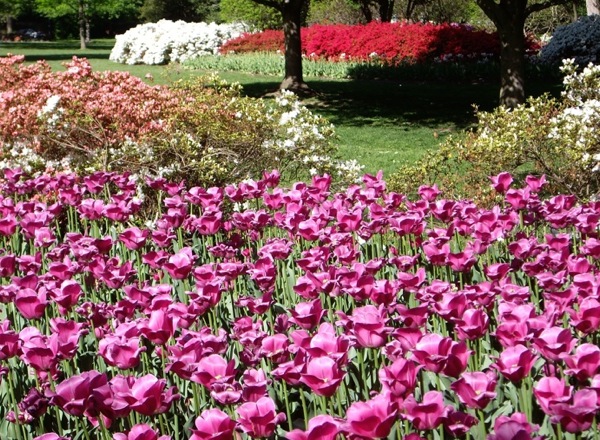
Charles Dudley Warner: My Summer in a Garden (1870)
"To own a bit of ground, to scratch it with a hoe, to plant seeds,
and watch the renewal of life -- this is the commonest delight of the race, the most satisfactory thing a man can do."
"no man but feels more of a man in the world if he have a bit of ground that he can call his own."
"The thing generally raised on city land is taxes."
landscape -- “the thin layer of soil that forms the patchy covering over the continents controls our own existence and that of every other animal on the land. Without soil, land plants as we know them would not grow, and without plants no animals could survive.”
(Carson, p. 55).
geographical regeneration -- the articulation of an idea by George P. Marsh that renewal of civilization is only brought about by a conscious intent of a society and its people to invest in nature and natural sources of wealth.
George Perkins Marsh (1864) that all civilizations live only so long as they renew the earth upon which they sustain themselves.
critical argument | contents | landscape | an American machine | conclusion
§§§
RECAPITULATION:The Machine in the Garden,
Two opposites – technological power and natural energy – must be reconciled and in the national desire to create a new Jerusalem, or as it was manifest as a pastoral agrarian egalitarian society in the west, we have had to make weighty decisions on how to control the wilderness.
It is not the decisions that are as important and the ways in which we express these contradictions and who were the people that such dominant expressions had harmed.
Street scene from the aftermath of the Johnstown flood.
critical argument | contents | landscape | an American machine | conclusion
![]()
A summary of important ideas and notes on the key terms and concepts.
natural -- natus is Latin meaning to be born, original
artificial -- all that humans create expressing our feelings
pastoral -- a literary tradition, a grazing economy, flocks
Are you discontent? Freud's assertion of civilization
infrastructure: the "built environment's" support system is the "precariousness of civilization when exposed to the full fury of nature."
edenic vision: shared Judaeo-Christian-Islamic tradition that we have lost paradise, a past golden age, that is revived and revitalized only to be subjected to the human misunderstanding and misuse of the power inherent in nature, that we have come to control in but a limited sense only with enormous unintended consequences."
critical argument | contents | landscape | an American machine | conclusion
![]()
An allusion to world view:
"Shakespeare leaves no doubt about the difference between the original state of nature as Gonzalo imagines it and as it actually exists in the world of The Tempest."
The Machine in the Garden, p. 51.
§§§
identity, a sense of self worth, importance, distinction
Marx argues that emotional learning is actually the unconscious base on which cognition rests, underlying feelings are the scaffold upon which the rationality of our lives is sustained.
Wordsworth's "collateral objects & appearances"
(31)
The Lake District where Wordsworth resided and sought inspiration.
rational thought, the conscious expression of ideas
intuitive grasp, the apprehension of "logos" & order
wilderness as the soul's redemptive arena, Sinai desert.
John the Baptist & desert of Canaan, Jordan River.
The Machine in the Garden, pp. 8, 18-19, 31, 51, 67, 71.
§§§
critical argument | contents | landscape | an American machine | conclusion
![]()
Prosperity requires a benign and magnanimous control of the elements of wealth?
Prospero, magus or magician whose power transforms
Caliban, wild forces of the earth resisting any control
Arcadia and Virginia: the literary ideal vs. wild reality
the garden as repository of the good
What is the landscape of Ceres? farms, fields & groves
"The Tempest... is a comedy in praise neither of nature nor of civilization, but of a proper balance between them." "feed my innocent people."
plantation in paradise: American sugar, tobacco, indigo
"the art itself is Nature." artificial resides within natural
The Machine in the Garden, p. 64-65, 62, 67.
critical argument | contents | landscape | an American machine | conclusion
![]()
§§§
The topography of the Tempest anticipates the moral geography of the American imagination
Kentucke -- actuall meant -- the dark and bloody ground
the legends of the three colors
Red -- native (Indian) peoples (Seneca)
White -- European descendants
Black -- African descendants
mestizo process: the mixture of native American, Eurasian & African cultures is often forgotten.
original sin of the pioneers is Cain slaying Abel
(fratricide) herdsman vs. farmer
plausibility of a pastoral retreat (escape): Eden's garden
The Machine in the Garden, p. 72
§§§
critical argument | contents | landscape | an American machine | conclusion
![]()
"a fully articulated pastoral idea of America did not emerge until the end of the eighteenth. The story of its emergence illustrates the turning of an essentially literary device to ideological or (using the word in its extended sense) political uses.
By 1785,... the pastoral ideal had been removed from the literary mode to which it traditionally had belonged and applied to reality."
"the stock image of America as nature's garden, a new paradise of abundance."
Robert Beverley (1703)
anticipates the coming fashion in thought & feeling
foundations of romanticism lie in Locke & Newton
"sensational psychology" landscape as sensory area
The Machine in the Garden, pp. 73, 75, 82.
§§§
"it is necessary to insist upon the vital distinction between the pastoral ideal and the pastoral design.
"a highly wrought aesthetic form... ordering of meanings" [expressive: literary and artistic]
"Jefferson's formulation of the pastoral ideal affirms a belief which may serve as a guide for social policy."
"For more than a century,...The American people held on to a version of the pastoral ideal not unlike the one that Jefferson had set forth in 1785, investing it with a quality of thought and feeling that can only be called mythic.
"...myth as a mode of belief.... they shared an idea....actually saw themselves creating a society in the image of a garden . . . . a believable definition of reality."
The Machine in the Garden, pp. 74-75. 142-143.
critical argument | contents | landscape | an American machine | conclusion
§§§
Threads of the emergent approach to nature:
Sir Isaac Newton (1687) reliable external reality
sensory based psychology of Locke (1690s)
"a massive shift in prevailing ideas about man's relations to nature."
Physiocrats - agrarian enterprise is the source of wealth
Rousseau's ideal that the state of nature is healthy
Burke's idea of the sublime
Gilpin's idea of the picturesque
emotion and feeling equal or superior to reason
"appeal of the rural as against urban life."
a preoccupation with the truth of the expressive arts
passion for nature, wild or cultivated, the middle ground
The Machine in the Garden, p. 74, 96-98.
critical argument | contents | landscape | an American machine | conclusion
§§§
"the sequence embodies the Lockian presuppositions,... about the relations between nature, man, and society.
"in the beginning," said Locke, "all the world was America...."
landscape of reconciliation
"Those who labour in the earth are the chosen people..."
The Machine in the Garden, p. 119-120.
critical argument | contents | landscape | an American machine | conclusion
§§§
Chinese landscapes: stylized portrayal of features
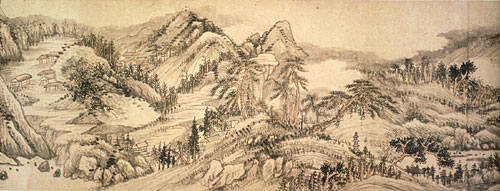
Indian (east) gardens; medicinal plants & exotic animals
Renaissance Spain & Italy, Islamic manuscripts, math
Perspective -- proportion after Brunelleschi, 1377-1446
• background -- the setting of the work
• foreground -- the focus of the work
critical argument | contents | landscape | an American machine | conclusion
![]()
Jacob van Ruisdael, (1628-82) Dutch 1640-70s
Claude Lorraine, (1660-1682) French 1650s
Thomas Doughty, 1820s, New York
Thomas Cole, 1830s, Hudson River School
Asher B. Durand, 1840s, "Kindred Spirits"
Karl Bodmer, 1830s, Rocky Mtn. School
Albert Bierstadt,1860s, Sierra Nevada & Rockies
Nature and the American, pp 35-53.
§§§
William Cullen Bryant (1811) poet, writer, lawyer
an entirely new approach to the contemplation of nature
park ideas influenced Frederick Law Olmsted Sr.
Origins:
Britain: Burke's sublime, 1756; Gilpin's picturesque, 1768
John Constable painter
William Wordsworth & the Lake poets
Germany: J.W. von Goethe, Kaspar David Friedrich
America: Jeffersonian & Jacksonian political traditions
James F. Cooper's, The Leatherstocking Tales &
Washington Irving's,The Knickerbocker TalesWashington Allston, 1804, brought European ideas back to America
Hans Huth
"sublimity of untamed wilderness and the majesty of the eternal mountains." Thomas Cole (1835)
Nature and the American, pp. 11, 14-15, 18, 23, 25, 31-43, 50, 53.
§§§
"Was it true that the American scene was inferior to the European one because it still lacked sufficient historical or legendary associations in spite of all the literary and artistic efforts which had been made for decades?"
"Could any friendly relationship between man and nature be established without the existence of such associations, and how did the situation compare to that in Europe?"
George William Curtis said "Space and wildness are the proper praises of American scenery." (not picturesque)
"To study nature, to rely on his own resources when he had the urge to visualize what he had seen or to express what he felt -- that indeed became the vocation of the American painter, as it was to be that of the scientist & writer."
Nature and the American, pp. 49-50, 52-53.
§§§
critical argument | contents | landscape | an American machine | conclusion
18
16th century enters the English imagination & language
"a unit of human occupation, indeed a jurisdiction, as much as anything that might be a pleasing object of depiction."
"in the Netherlandish flood-fields, itself the sight of formidable human engineering, a community developed the idea of landschap, which in the colloquial English of the time became a landskip."
"Its Italian equivalents, the pastoral idyll of brooks and wheat-gold hills...settings for classical myth & sacred scripture."
Simon Schama, Landscape & Memory, pp. 10-11.
§§§
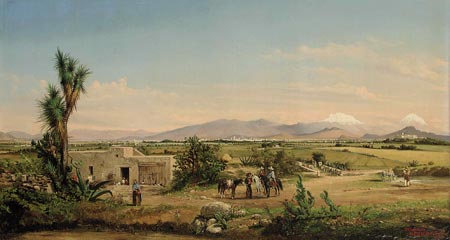
Landscape as a visually coherent area of demarcated space and measured against human behavioral, social, and spiritual needs;
A view shed, or birds-eye-view, a setting.

Philadelphia in the early 19th century
Cambridge from Boston in the late 20th century
critical argument | contents | landscape | an American machine | conclusion
![]()
Some enduring American values are:
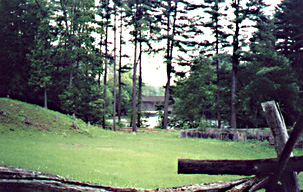
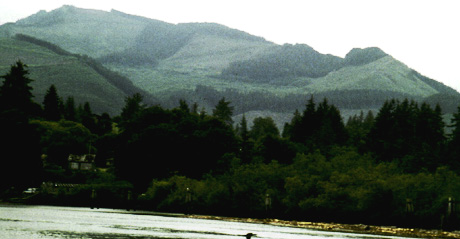
land as a source of wealth, property, life, & liberty.
prosperity as a moral duty (Protestant Ethic) and wealth as an indictor of virtuousness.
place & identity as a psychological necessity.
aesthetically pleasing, sublime, majestic, wild or scenic.
The existence of civil religion: a public space commemorating the past.
That private real estate as a source of personal fortune
public commonwealth as a necessity for civic virtue.

Jefferson's book was divided into seven subjects that caught his attention.
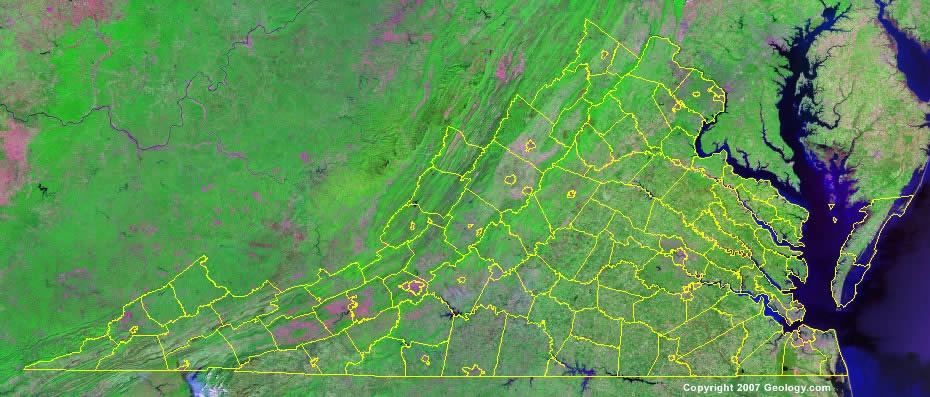
Rivers
Seaports
Mountains
Cascades
Products [Animal, vegetable & mineral]
Climate
critical argument | contents | landscape | an American machine | conclusion
![]()
Agrarian sympathies
"the sequence embodies the Lockian presuppositions,... about the relations between nature, man, and society.
"in the beginning," said Locke, "all the world was America...."
Locke understood that for him and his world of horsepower and titled nobility – cultivated land was the basis of all "wealth."
critical argument | contents | landscape | an American machine | conclusion
![]()
landscape of reconciliation
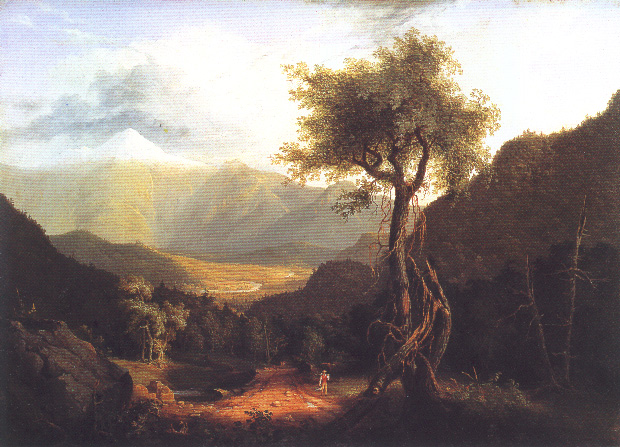
"Those who labour in the earth are the chosen people..."
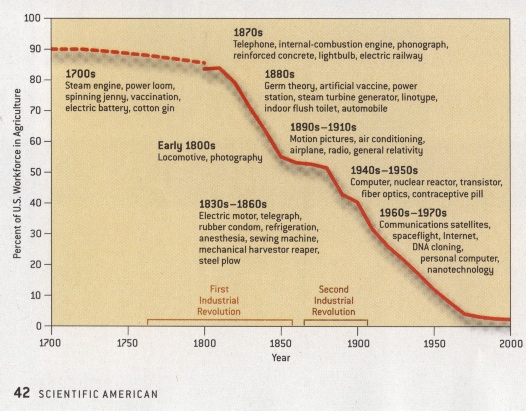
The Machine in the Garden, p. 119-120.
§§§
These pages are for educational purposes only.
As such they represent a series of notes from Leo Marx, The Machine in the Garden taken by the J.V. Siry with additional depth of exposition and some analysis that relies on authors from Hans Huth, Karl Marx, Charles Darwin, Simon Schama, Roderick Nash, Donald Worster, Carolyn Merchant, William Cronon, Henry Nash Smith, Paul B. Sears, & Carl Ortwin Sauer to Paul Ehrlich, Garrett Hardin, Ian McHarg, and E. O. Wilson.
§§§
pastoral ideals | critical argument | motif | contents | landscape | an American machine | conclusion